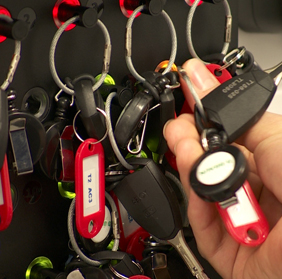Abloy UK and the medical equipment manufacturer Bristol Maid have supplied the Queen Elizabeth (QE) Hospital Birmingham with over 1400 keys and 1600 locks, fitting PROTEC2 CLIQ and Traka21 key management systems, pictured, for security of medicines.
An issue faced by QE and many others in healthcare is that of medicine management, and how to secure drugs while still giving nurses quick access. Poor management of keys detrimentally affects nursing efficiency, as staff using older mechanical key systems can find it hard to keep track of who has the keys, and searching for that person to gain access to controlled drugs wastes a substantial cumulative amount of nurse’s time. Hence at the QE the PROTEC2 CLIQ key system from Abloy UK. It’s described as an access control system based on mechanical disc cylinders, with encrypted electronic locking and identification.
Power to the lock is provided by the CLIQ key, so no batteries or wires are required to either the lock or drug cabinet, making it the product makers say suitable for retrofit – even for applications such as mobile drug trolleys. The product allows for remote key management, providing audit trails on locks and padlocks, and the ability to remove lost or stolen keys from the system, thus increasing the security of controlled drugs.
PROTEC2 CLIQ was combined with the Traka21 key management product, which provides nurses’ access to a single key for the duration of their shift. By entering a PIN code to access a specific key which they validate using the wall programming unit, they can access every cabinet they’re authorised to open.
Aaron Ballard Ridley, Sales Specialist – Healthcare, Abloy UK, said: “The PROTEC2 CLIQ and Traka21 systems offer key audit trails, which means Chief Pharmacists and Nurse Managers can view a report of exactly who has accessed particular cabinets or trolley’s at any time. This substantially increases the security of medicine cabinets, whilst making them easier to manage. Efficiency is also increased, as each nurse – whether they are permanent or bank staff – has access to their own key with personalised access rights, and they don’t have to waste time looking for who has the key to a particular cupboard.”
And Inderjit Singh, Chief Pharmacist at QE Birmingham, said: “For us, the key return on investment is the quality of service we’re providing. The message from all nursing staff is that patients are getting medicines much easier and in a more timely fashion.”
To view the video case study, go to https://youtu.be/G_P5qINuw48. And visit www.abloy.co.uk.









